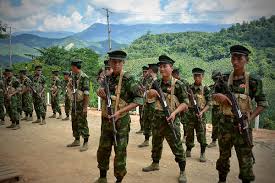Myanmar’s military junta has extended an olive branch to its opponents, calling for dialogue and an end to armed resistance. However, this unexpected peace offer comes at a time when opposition forces advance, putting significant pressure on the military regime that seized power in February 2021. The move has been met with skepticism and outright rejection from various quarters, highlighting the deep-seated mistrust and ongoing tensions in the country.
Military Junta’s Unexpected Call for Dialogue
The State Administration Council (SAC), the official name adopted by the military junta, issued a statement urging ethnic armed groups and People’s Defence Forces (PDF) to abandon what it termed the “terrorist way” and engage in political discussions. Published in the state-run Global New Light of Myanmar, the statement invited opposition forces to “contact the State to resolve political issues through party politics or electoral processes.”
This unexpected move appears to be an attempt by the military to regain control of the narrative as it faces mounting pressure from coordinated opposition efforts. The SAC framed the offer as part of its commitment to organizing new elections, announcing plans for a census starting October 1 to “ensure the accuracy of voter lists.”
Opposition Forces Advance, Rejecting Military’s Overture
The National Unity Government (NUG), comprising elected lawmakers ousted in the 2021 coup, swiftly dismissed the military’s offer. NUG spokesperson Nay Phone Latt stated that the proposal was not worth considering, reflecting the deep distrust between the opposing sides.
The rejection comes in the context of significant territorial gains by anti-coup forces since their major offensive launched in October 2023. The combined efforts of ethnic armed organizations and PDFs have resulted in the control of substantial areas of the country, putting unprecedented pressure on the military junta.
Civil society groups have joined in criticizing the military’s overture. Progressive Voice, a rights-based policy and advocacy group, declared, “Let’s be clear: The junta is teetering on the brink of collapse. This sham election is nothing more than a desperate ploy for false legitimacy and hoax democracy – an exit ticket being sold to the international community.”
Human Rights Concerns and International Scrutiny
The military’s peace offer is set against a backdrop of severe human rights abuses and international condemnation. The Assistance Association for Political Prisoners reports that at least 5,706 people have been killed and nearly 21,000 detained since the coup. United Nations investigators have raised alarms about an “alarming” escalation in crimes against humanity and war crimes committed by the military.
The junta’s proposed elections have been met with widespread skepticism. In January 2023, the military announced strict new election laws that led to the exclusion of the National League for Democracy (NLD) and dozens of other political parties. The imprisonment of Aung San Suu Kyi, sentenced to 27 years following secret trials on charges widely seen as politically motivated, further undermines the credibility of any electoral process under military oversight.
International observers and human rights organizations have consistently criticized the military’s actions. Mark Farmaner, director of Burma Campaign UK, commented on the similarity between the current situation and past military regimes, stating, “The military was probably hoping that the current generation of diplomats didn’t know that this is from their decades-old playbook and doesn’t represent any kind of genuine change in approach.”
As opposition forces advance, the Myanmar military’s peace offer stands as a testament to the shifting dynamics in the country’s ongoing conflict. The rejection of this overture by the NUG and civil society groups underscores the deep-rooted challenges facing any potential resolution to the crisis. With the military facing unprecedented pressure and international scrutiny intensifying, the path forward remains uncertain. The coming months will likely prove crucial in determining whether Myanmar can move towards genuine dialogue and reconciliation or if the country will continue to be mired in conflict and political instability.
Related News
















